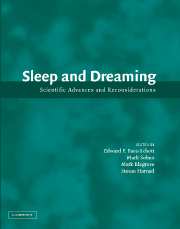Book contents
- Frontmatter
- Contents
- Preface
- Introduction
- 1 Dreaming and the brain: Toward a cognitive neuroscience of conscious states
- 2 Dreaming and REM sleep are controlled by different brain mechanisms
- 3 A review of mentation in REM and NREM sleep: “Covert” REM sleep as a possible reconciliation of two opposing models
- 4 The case against memory consolidation in REM sleep
- 5 The reinterpretation of dreams: An evolutionary hypothesis of the function of dreaming
- Open Peer Commentary and Authors' Responses
- References
- Postscript: Recent findings on the neurobiology of sleep and dreaming
- Index
1 - Dreaming and the brain: Toward a cognitive neuroscience of conscious states
Published online by Cambridge University Press: 11 January 2010
- Frontmatter
- Contents
- Preface
- Introduction
- 1 Dreaming and the brain: Toward a cognitive neuroscience of conscious states
- 2 Dreaming and REM sleep are controlled by different brain mechanisms
- 3 A review of mentation in REM and NREM sleep: “Covert” REM sleep as a possible reconciliation of two opposing models
- 4 The case against memory consolidation in REM sleep
- 5 The reinterpretation of dreams: An evolutionary hypothesis of the function of dreaming
- Open Peer Commentary and Authors' Responses
- References
- Postscript: Recent findings on the neurobiology of sleep and dreaming
- Index
Summary
Abstract: Sleep researchers in different disciplines disagree about how fully dreaming can be explained in terms of brain physiology. Debate has focused on whether REM sleep dreaming is qualitatively different from nonREM (NREM) sleep and waking. A review of psychophysiological studies shows clear quantitative differences between REM and NREM mentation and between REM and waking mentation. Recent neuroimaging and neurophysiological studies also differentiate REM, NREM, and waking in features with phenomenological implications. Both evidence and theory suggest that there are isomorphisms between the phenomenology and the physiology of dreams. We present a three-dimensional model with specific examples from normally and abnormally changing conscious states.
Keywords: consciousness, dreaming, neuroimaging, neuromodulation, NREM, phenomenology, qualia, REM, sleep
Introduction
Dreaming is a universal human experience that offers a unique view of consciousness and cognition. It has been studied from the vantage points of philosophy (e.g., Flanagan 1997), psychiatry (e.g., Freud 1900), psychology (e.g., Foulkes 1985), artificial intelligence (e.g., Crick 1994), neural network modeling (Antrobus 1991; 1993b; Fookson & Antrobus 1992), psychophysiology (e.g., Dement & Kleitman 1957b), neurobiology (e.g., Jouvet 1962) and even clinical medicine (e.g., Mahowald & Schenck 1999; Mahowald et al. 1998; Schenck et al. 1993). Because of its broad reach, dream research offers the possibility of bridging the gaps in these fields.
We strongly believe that advances in all these domains make this a propitious time to review and further develop these bridges. It is our goal in this target article to do so.
- Type
- Chapter
- Information
- Sleep and DreamingScientific Advances and Reconsiderations, pp. 1 - 50Publisher: Cambridge University PressPrint publication year: 2003
- 6
- Cited by



